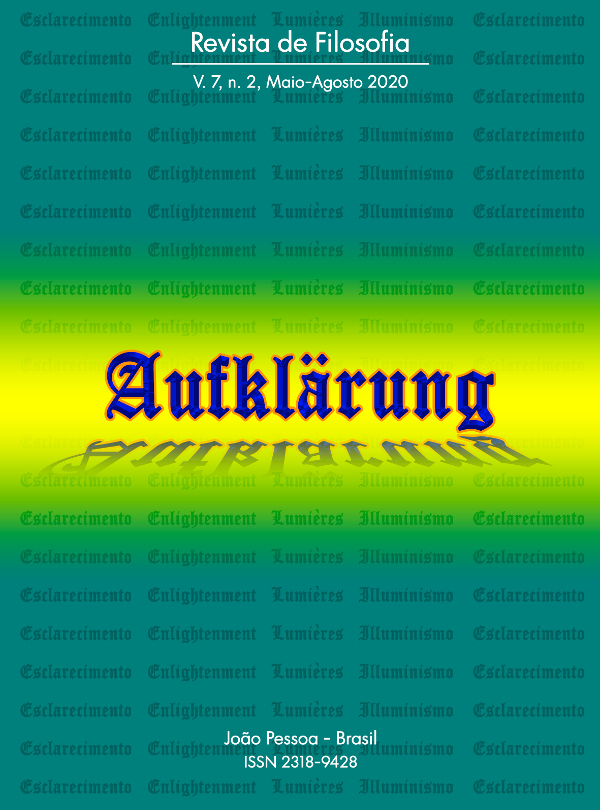Some remarks on R. Carnap’s concept of construction in Aufbau and E. Husserl’s concept of constitution
DOI:
https://doi.org/10.18012/arf.v7i2.51822Palavras-chave:
Rudolf Carnap, Edmund Husserl, Aufbau, ConstitutionResumo
This paper turns to the concept of constitution and some to it more immediately related notions contained in R. Carnap's Aufbau and Husserl's works that might have had some influence there, in order to find similarities and differences between them. It hopefully will contribute to this assessment of the plausible hypothesis, recently raised in the literature, of an influence of the father of phenomenology not explicitly sufficiently credited in Aufbau. The argumentative strategy was to expose, firstly in a separate way, the relevant points in each strand and then to make the comparative examination. This first analysis took place by two general aspects, namely, to address, on the one hand, the very relation of constitution and what is a system of it and, given the implicated foundationalism attributed to such notion, the data which are at the base of system like this. Then I move on to examine the differences and similarities between such expositions. As result, similarities were observed in that the two of them imply a broader thesis of foundationalism; they propose, in this, to an encompassing system. In addition, they contend that the fact that there is a difference between a lower-level object and a higher-level object does not imply between them mereological composition or some necessary commonality of properties. However, there are also differences regarding the kind of relationship that the notions of constituting imply in each case. Distinctions were also found about the role of sensations in each system; but in that sense, there is, in both perspectives, also similarities concerning their status. The paper concludes with the notion that there must be husserlian influences in the Aufbau not sufficiently credited. However, it is unreasonable the diagnosis of extreme importance of Husserl's influence.
Downloads
Referências
BARBER, M. Holism and horizon: Husserl and McDowell on non-conceptual content. Husserl Studies, 24(1): 79–97, 2008.
CARNAP, R. The logical structure of the world. Berkeley: University of California Press, 1967
CARNAP, R. The Unity of Science. Bristol: Thoemmes Press, 1995.
COBB-STEVENS, R. Husserl and analytic philosophy. Dordrecht: Kluwer Academic Publishers, 1990.
DRUMMOND, J. Husserlian Intentionality and Non-foundational Realism: Noema and Object. Dordrecht: Springer, 1990.
DRUMMOND, J. Historical Dictionary of Husserl's Philosophy. Lanham: Scarecrow Press, 2007.
DUTRA, L. Oposições Filosóficas: A Epistemologia e suas Polêmicas. Florianópolis: Editora da UFSC, 2005
DUTRA, L. Pragmática da Investigação Científica. São Paulo: Loyola, 2008
FRIEDMAN, M. Carnap’s Aufbau Reconsidered. Noûs 21(4): 521–45, 1987
FRIEDMAN, M. Reconsidering logical positivism. Cambridge: Cambridge University Press, 1999.
HADDOCK, G. The Young Carnap’s Unknown Master. Farnham: Ashgate Publishing, 2008.
HUSSERL, E Ideen zu einer reinen Phänomenologie und einer phänomenologischen Philosophie II. Den Haag: M. Nijhoff, 1952.
HUSSERL, E. Ideas pertaining to a pure phenomenology and to a phenomenological philosophy. The Hague: Martinus Nijhoff, 1982
HUSSERL, E. Thing and space. Lectures of 1907 (R. Rojcewicz, Trans.). Dordrecht: Kluwer Academic Publishers, 1997.
HUSSERL, E. Logical Investigations – Volume 1. Routledge, 2001a.
HUSSERL, E. Logical Investigations – Volume 2. Routledge, 2001b.
KRAFT, V._El Círculo de Viena. Madrid: Taurus Ediciones, 1986._
Leitgeb, H. New life for Carnap’s Aufbau? Synthese 180 (2):265–299, 2011.
LOCKE, J. An essay concerning human understanding. Oxford: Clarendon Press, 1975.
MOONEY, T. Understanding and simple seeing in Husserl. Husserl Studies 26 (1):19-48, 2010.
MAYER, Y. Die Konstruktion der Erfahrungswelt: Carnap and Husserl Erkenntnis 35 (1): 287-303, 1991
MAYER, Y. Carnap und Husserl. In: BELL, D and VOSSENKUHL, W (Eds). Wissenschaft und Subjektivität, 1992
MORMANN, T. Rudolf Carnap. Munich: C.H. Beck, 2000.
MOULINES, U. Las Raíces Epistemológicas del Aufbau de Carnap, Dianoia 1982 (reprint in Ramón Cirera, Andoni Ibarra and Thomas Mormann (eds), El Programa de Carnap), pp. 45–74.
PINCOCK, C. Carnap's logical structure of the world. Philosophy Compass 4 (6):951-961, 2009.
ROY, J-M, Carnap’s Husserlian Reading of the Aufbau. AWODEY, S; KLEIN, C. (Eds.). Carnap Brought Home: The View from Jena. Chicago: Carus Publishing Company, 2008.
RICHARDSON, A. W. Carnap’s Construction of the World: the Aufbau and the Emergence of Logical Empiricism. Cambridge: Cambridge University Press, 1998.
RUSSELL, B. The Relation of Sense-Data to Physics. In: Mysticism and Logic and Other Essays. Londres: George Allen & Unwin, 1959.
SARKAR, S. Husserl's role in Carnap's der raum. In: Bonk, T (Ed.). Language, Truth and Knowledge. Dordrecht: Kluwer Academic Publishers, 2003.
SCHUHMANN, K. Husserl-Chronik. Den Haag, 1977.
SPIEGELBERG, H. The Context of the Phenomenological Movement. The Hague: Martinus Nijhoff:, 1981.
TAHKO, T., Fundamentality. The Stanford Encyclopedia of Philosophy (Fall 2018 Edition), Edward N. Zalta (ed.), 2018. Disponível em https://plato.stanford.edu/archives/fall2018/entries/fundamentality/.
WILLIFORD, K. Husserl’s hyletic data and phenomenal consciousness. Phenomenology and the Cognitive Sciences. 12 (3):501-519, 2013.
ZAHAVI, D. Constitution and ontology: Some remarks on Husserl's ontological position in the Logical Investigations. Husserl Studies 9 (1):111-124, 1992.
Arquivos adicionais
Publicado
Como Citar
Edição
Seção
Licença
Política de Direito Autoral para os itens publicados pela Revista:
1.Esta revista é regida por uma Licença da Creative Commons aplicada a revistas eletrônicas. Esta licença pode ser lida no link a seguir: Creative Commons Attribution 4.0 International (CC BY 4.0).
2.Consonante a essa politica, a revista declara que os autores são os detentores do copyright de seus artigos sem restrição, e podem depositar o pós-print de seus artigos em qualquer repositório ou site.
Política de Direito de Uso dos Metadados para informações contidas nos itens do repositório
1. Qualquer pessoa e/ou empresa pode acessar os metadados dos itens publicados gratuitamente e a qulquer tempo.
2.Os metadados podem ser usados sem licença prévia em qualquer meio, mesmo comercialmente, desde que seja oferecido um link para o OAI Identifier ou para o artigo que ele desceve, sob os termos da licença CC BY aplicada à revista.
Os autores que têm seus trabalhos publicados concordam que com todas as declarações e normas da Revista e assumem inteira responsabilidade pelas informações prestadas e ideias veiculadas em seus artigos, em conformidade com a Política de Boas Práticas da Revista.






































